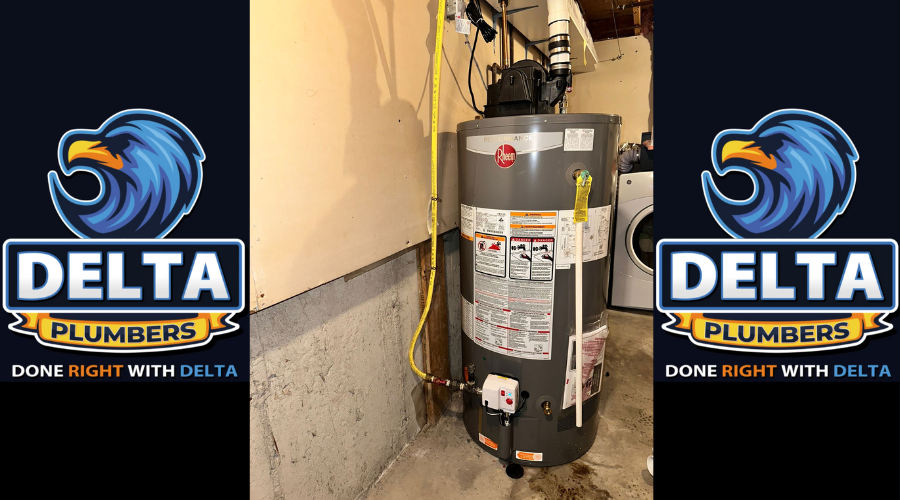Water heaters are essential appliances that ensure a steady supply of hot water for daily needs, from bathing to cooking and cleaning. However, without regular maintenance, they can lose efficiency and even fail prematurely. One of the most critical maintenance tasks is flushing your water heater. This blog explores the benefits of regular water heater flushing, addressing key questions and providing practical advice tailored to Delta Plumbers’ expertise.

Picture Source – Delta Plumbers
Is It Really Necessary to Flush Your Water Heater?
Yes, flushing your water heater is necessary to maintain its efficiency and longevity. Over time, sediment from water builds up at the bottom of the tank. This sediment layer acts as an insulator, making it harder for the heating element to heat the water efficiently. The result is increased energy consumption, higher utility bills, and potential damage to the tank.
By flushing your water heater regularly, you remove the sediment, ensuring the appliance operates efficiently. Neglecting this task can lead to issues such as:
- Reduced water heating capacity.
- Noisy operation due to sediment interaction with heating elements.
- Premature wear and tear on the unit.
Delta Plumbers recommend flushing your water heater at least once a year to keep it in optimal condition. This simple maintenance task helps maintain steady hot water supply, improves energy efficiency, and prevents expensive repairs.
Regular flushing not only removes the sediment but also prevents it from accumulating to levels that might damage internal components. The process ensures your water heater operates as intended, providing consistent performance and reducing the risk of system failures.
Also Read: How to Install a Frost-Free Faucet

Picture Source – Delta Plumbers
Should You Flush a 10-Year-Old Water Heater?
Flushing a 10-year-old water heater can still be beneficial, but its effectiveness depends on the unit’s condition and maintenance history. If the water heater has never been flushed, the sediment buildup might be substantial, potentially causing clogging or irreversible damage.
For older units, flushing can help:
- Improve heating efficiency by removing sediment.
- Prevent further sediment accumulation that can worsen existing problems.
- Extend the life of the appliance by reducing stress on internal components.
However, caution is required. If the tank is severely corroded or the sediment has hardened, flushing might not solve all the issues and could even expose weaknesses in the tank. In such cases, consulting professionals like Delta Plumbers is essential to assess whether repair or replacement is the better option. Their expertise ensures safe and effective solutions tailored to your water heater’s age and condition.
For older water heaters, it’s also advisable to inspect key components like the anode rod and heating element during the flushing process. These parts may need replacement to maintain the unit’s functionality.
Also Read: Benefits of Insulating Your Pipes: A Complete Guide

Picture Source – Delta Plumbers
Will Flushing Water Heater Improve Water Pressure?
Yes, flushing your water heater can improve water pressure. Sediment buildup not only affects heating efficiency but can also restrict water flow. When sediment accumulates, it reduces the volume of water the tank can hold and narrows the pathways for water to pass through.
By removing the sediment during flushing, you can:
- Restore proper water flow and pressure.
- Increase the available hot water supply.
- Prevent clogs in pipes and fixtures caused by sediment fragments.
Delta Plumbers have helped countless homeowners improve their water pressure simply by performing a thorough water heater flush. This quick maintenance step can make a significant difference in your water system’s performance, ensuring smooth and efficient operation.
Additionally, regular flushing helps prevent mineral deposits from traveling through your plumbing system, which could otherwise lead to blockages in faucets and showerheads.
Also Read: Fix a Running Toilet: A Complete Guide

Picture Source – Delta Plumbers
What Are the Benefits of Flushing Water?
Regularly flushing your water heater provides numerous benefits:
1. Improved Energy Efficiency:
By removing sediment, your water heater can heat water more efficiently, lowering energy bills and reducing environmental impact.
2. Extended Appliance Lifespan:
Sediment buildup accelerates wear and tear. Flushing protects your water heater from premature failure, ensuring long-term reliability.
3. Better Water Quality:
Sediment can cause water discoloration and affect its taste. Flushing ensures cleaner, clearer water that’s safe for household use.
4. Reduced Noise:
Sediment interacting with the heating element often causes popping or rumbling noises. Flushing eliminates these disturbances for quieter operation.
5. Lower Maintenance Costs:
Regular maintenance prevents costly repairs by addressing minor issues before they escalate into major problems.
Delta Plumbers emphasize the importance of routine maintenance, including flushing, to enjoy these benefits fully. Their services are designed to keep your water heater functioning at its best year-round.
In addition to these benefits, flushing helps ensure compliance with manufacturer warranties, many of which require regular maintenance as a condition for coverage.
Also Read: Role of Plumbing in Home Renovations

Picture Source – Delta Plumbers
How Do I Know If My Water Heater Needs to Be Flushed?
Several signs indicate it’s time to flush your water heater:
1. Noisy Operation:
Popping or rumbling sounds suggest sediment buildup interfering with the heating process.
2. Discolored Water:
Rusty or cloudy water is a clear sign of tank sediment contaminating your water supply.
3. Reduced Hot Water Supply:
If your water runs out quickly, sediment may be taking up space in the tank, reducing its capacity.
4. Increased Energy Bills:
A sudden spike in energy costs might indicate your water heater is working harder than necessary due to sediment buildup.
Delta Plumbers can perform a professional inspection to determine whether your water heater needs flushing and provide tailored recommendations. Their comprehensive approach ensures your water heater operates efficiently and reliably.
Additionally, annual inspections by experts like Delta Plumbers can identify potential issues early, preventing costly breakdowns and ensuring uninterrupted hot water supply.
Also Read: The Benefits of Using Eco-Friendly Plumbing Products

Picture Source – Delta Plumbers
How Often Should I Replace My Anode Rod?
The anode rod is a crucial component of your water heater, protecting it from corrosion by attracting corrosive elements. Over time, the anode rod deteriorates and needs replacement.
Generally, you should check and replace the anode rod every 3-5 years. Factors affecting its lifespan include:
1. Water Quality:
Hard water accelerates anode rod depletion, requiring more frequent replacements.
2. Usage:
Heavily used water heaters demand more frequent inspections to ensure the rod remains effective.
3. Tank Material:
Tanks with built-in corrosion resistance may need less frequent rod replacements, but regular checks are still recommended.
Regular inspections by Delta Plumbers ensure your anode rod is in good condition, safeguarding your water heater from premature failure. Their expertise in anode rod replacement guarantees optimal protection for your water heater.
Replacing the anode rod as part of routine maintenance is a cost-effective way to extend your water heater’s life and prevent costly repairs down the line.
Also Read: Prevent Plumbing Issues During Cold Weather: A Complete Guide

Picture Source – Delta Plumbers
What Happens If You Never Drain Your Water Heater?
Neglecting to drain your water heater can lead to several problems:
1. Reduced Efficiency:
Sediment buildup forces the heating element to work harder, consuming more energy and raising utility bills.
2. Shortened Lifespan:
Corrosion and sediment-related wear and tear can cause the tank to fail prematurely, necessitating costly replacements.
3. Water Quality Issues:
Sediment can lead to discolored, foul-tasting water that’s unfit for consumption.
4. Increased Risk of Leaks:
Over time, sediment can cause the tank to corrode and leak, potentially damaging your home.
5. Costly Repairs:
Ignoring maintenance can lead to expensive breakdowns or replacements that could have been avoided with simple flushing.
Regularly draining your water heater is a simple yet effective way to prevent these issues. Delta Plumbers offer expert flushing services to ensure your water heater remains in top condition, protecting your investment and peace of mind.
Proactive maintenance, including flushing, ensures you avoid the stress and expense of unexpected system failures, providing consistent hot water for your household.
Conclusion –
Regular water heater flushing is a vital maintenance task that offers numerous benefits, including improved efficiency, extended lifespan, and better water quality. Addressing common questions about flushing—from necessity to its impact on water pressure—underscores its importance for homeowners.
At Delta Plumbers, we specialize in water heater maintenance, providing professional flushing services that help you avoid costly repairs and enjoy consistent hot water. Whether your water heater is brand new or a decade old, regular maintenance ensures it serves you well for years to come. Contact Delta Plumbers today to schedule your water heater flushing and experience the difference professional care makes.









